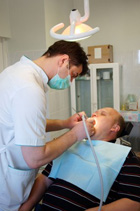 The phrase “restorative dentistry” covers a whole range of treatments for various conditions, including missing or damaged teeth and even the treatment of damaged bone tissue. Often, these repairs are carried out for cosmetic reasons, so that the patient no longer feels embarrassed or ashamed of the gaps in their smile, but often these dental problems can have more serious implications for a person’s oral or even general health.
The phrase “restorative dentistry” covers a whole range of treatments for various conditions, including missing or damaged teeth and even the treatment of damaged bone tissue. Often, these repairs are carried out for cosmetic reasons, so that the patient no longer feels embarrassed or ashamed of the gaps in their smile, but often these dental problems can have more serious implications for a person’s oral or even general health.
There are three types of restorative dentistry: prosthodontics, endodontics and periodontics. Each offers the patient help for whatever oral health problems they are suffering.
Prosthodontics
Prosthodontics are probably the most common type of restorative dental treatment, as this group includes fillings to repair the damage done by tooth decay and to prevent the tooth from having to be removed. Other types of this treatment include veneers, crowns and bridges, which are considered more of a cosmetic treatment.
Endodontics
Endodontics refers to problems inside the tooth, so serious problems with the tissue that make up the inner parts of the teeth rather than the surface enamel. Probably the most well known treatment that is part of the endodontics group is root canal treatment, in which damaged or diseased tissue from inside the tooth is removed and then filled again with a suitable synthetic material. Untreated root canal problems can be very painful, so patients are usually very keen to get their condition treated!
Periodontics
Periodontic specialists treat problems with your gums, including the common condition gingivitis or gum disease. This is an uncomfortable condition that can also have serious complications for the health of your teeth, so it’s important that you ask for help if you are suffering any of the symptoms of gingivitis, like bleeding gums. Gum disease is the leading cause of tooth loss in adults, which shows you just how important it is not to put off treatment, as by the time you seek help it could be too late to save your teeth.
Why you should have a regular check-up
It is important for patients to attend their check-ups regularly and seek help if they are even the slightest bit worried about any symptoms. Restorative dentistry is much more effective if the condition can be treated as early as possible, plus there is always the risk that you might lose teeth or have to have them extracted if you don’t get treated quickly enough!










